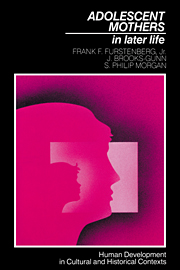Book contents
- Frontmatter
- Contents
- List of tables and figures
- Preface
- 1 Reassessing adolescent parenthood
- 2 Experience in adulthood
- 3 Pathways to success in adulthood
- 4 The children's experience
- 5 The intersecting life courses of adolescent mothers and their children
- 6 The life course of adolescent mothers: implications for public policy
- Appendixes
- Bibliography
- Index
3 - Pathways to success in adulthood
Published online by Cambridge University Press: 04 August 2010
- Frontmatter
- Contents
- List of tables and figures
- Preface
- 1 Reassessing adolescent parenthood
- 2 Experience in adulthood
- 3 Pathways to success in adulthood
- 4 The children's experience
- 5 The intersecting life courses of adolescent mothers and their children
- 6 The life course of adolescent mothers: implications for public policy
- Appendixes
- Bibliography
- Index
Summary
To understand how social contexts affect the life choices of individuals, social scientists often focus on cohorts that share a common experience or set of experiences. As Elder (1974) has demonstrated in his study of children of the Great Depression, the experience of certain events at a particular age can have important implications for subsequent behavior. Additionally, a particular cohort may have vastly different options available when confronting life events. Changing abortion laws provide a relevant example. Abortion was illegal during the 1960s, when the women we studied first became pregnant. Teenagers who became pregnant a decade later faced quite a different set of options. In short, a cohort's unique history can affect attitudes, opportunities, and behavior (Ryder, 1965).
The mothers in the Baltimore study are from roughly the same birth cohort. They also constitute, in demographers' terms, an age-parity cohort; that is, they had their first birth as teenagers. Not only do they share age-graded and historical experiences, which may be considered normative events (Baltes and Nesselroade, 1973), but they share a nonnormative event – teenage parenthood. They also made the crucial transition to parenthood at the same ages and in the same historical period. In addition, these teenage mothers grew up in the same city, almost all are black, and most came from relatively disadvantaged families. Despite these commonalities, enormous variation in outcomes occurred, as we learned in the previous chapter.
- Type
- Chapter
- Information
- Adolescent Mothers in Later Life , pp. 48 - 76Publisher: Cambridge University PressPrint publication year: 1987



